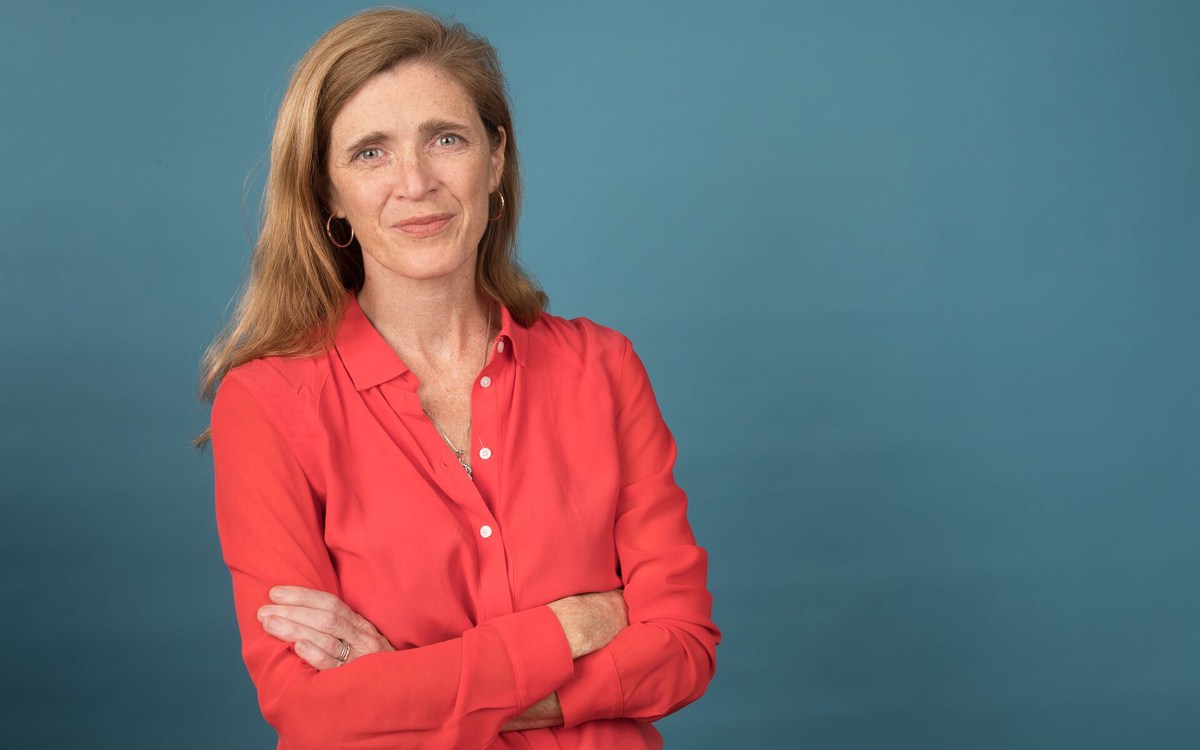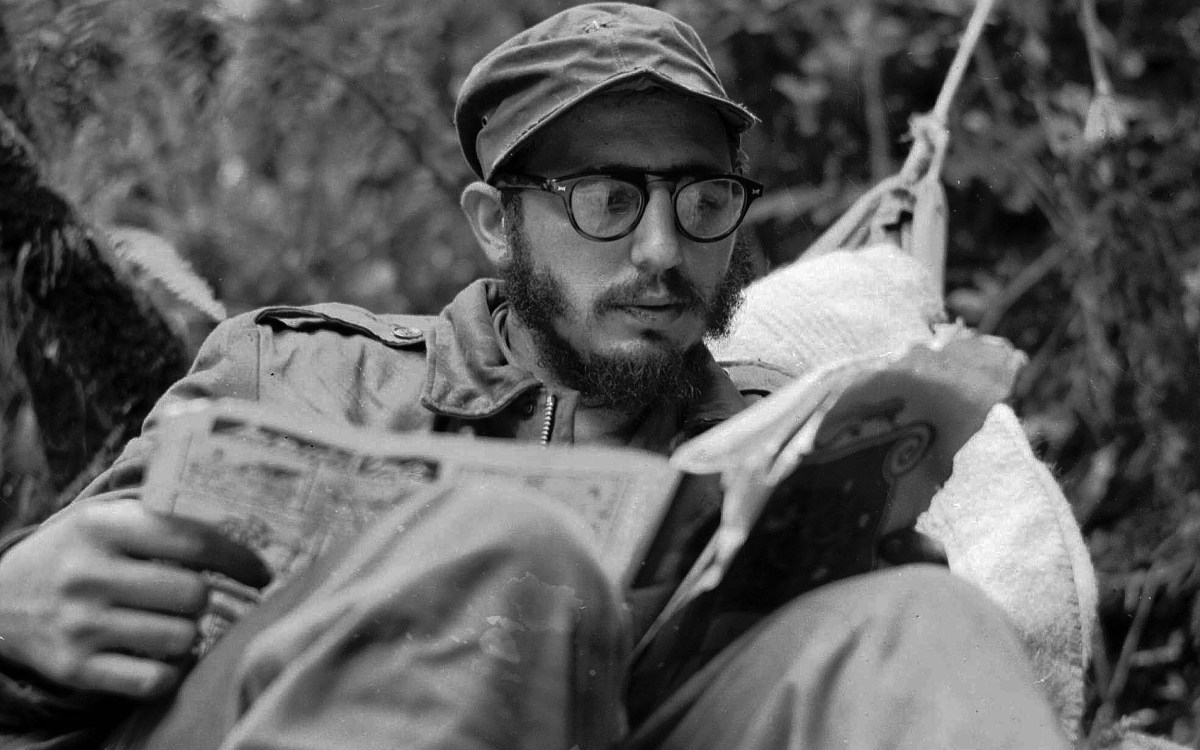A new hunt for Jimmy Hoffa
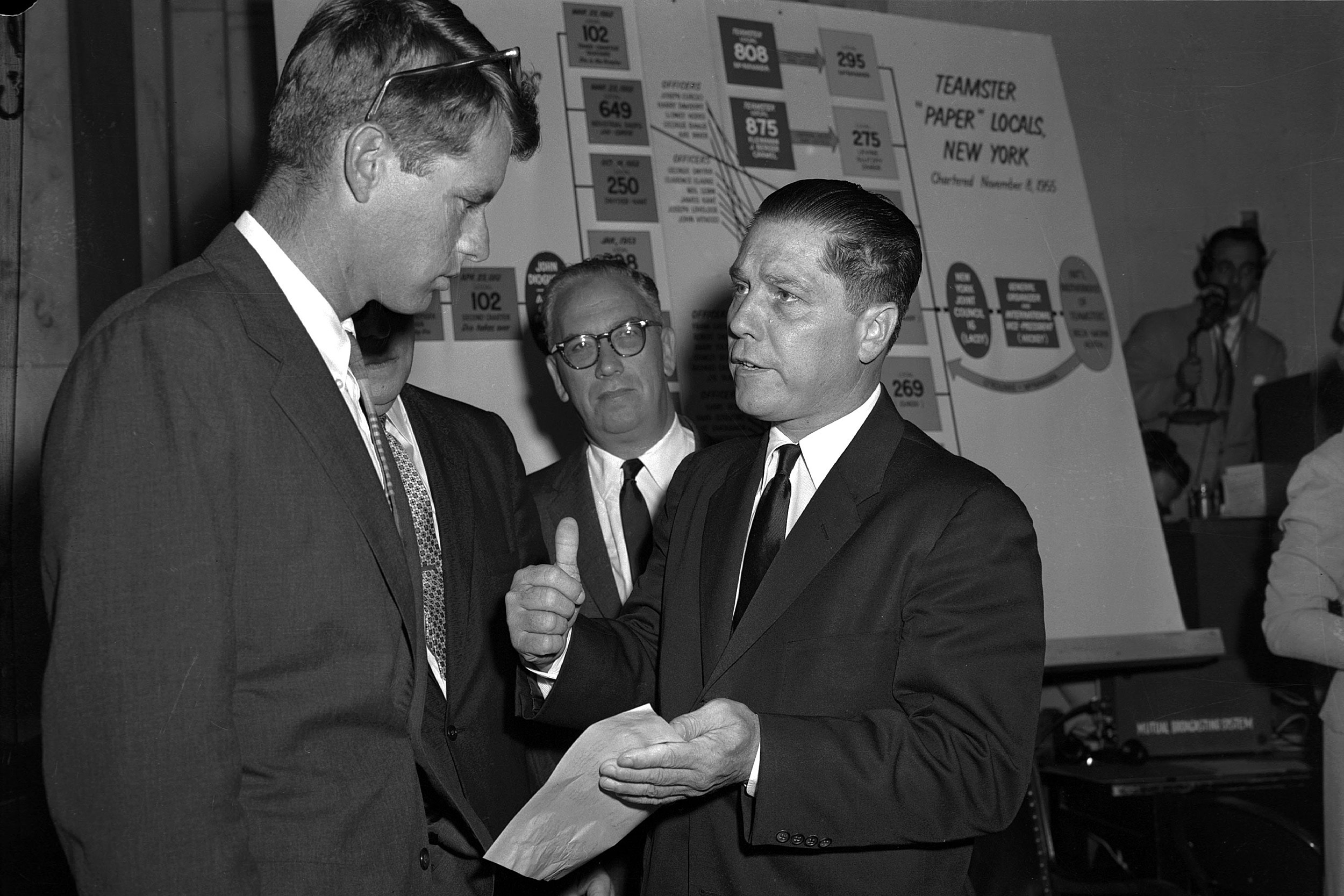
James Hoffa (right) speaks with Robert F. Kennedy, counsel for the Senate Rackets Investigating Committee in Washington, D.C., in 1957.
AP Photo
Law professor digs into the case to possibly solve the mystery of the disappearance — and to clear his stepfather’s name
Jimmy Hoffa, the brilliant but ruthless head of the Teamsters Union, had a taste for corruption and a knack for making powerful enemies, including his frequent business partners, the Mafia, and Attorney General Robert F. Kennedy. After President Nixon commuted his federal prison sentence, Hoffa planned to retake control of the Teamsters, much to the alarm of the mob. Then, one July day in 1975, Hoffa vanished without a trace from a restaurant parking lot outside of Detroit, a mystery that has inspired books, TV shows, movies (the most recent is Martin Scorsese’s film, “The Irishman”), and a raft of conspiracy theories. Jack L. Goldsmith, Henry L. Shattuck Professor of Law at Harvard Law School, was no Hoffa conspiracy buff, but he had good reason to think that Charles “Chuckie” O’Brien, Hoffa’s right-hand man and one of the FBI’s earliest suspects, had been falsely accused of driving Hoffa to his killers. First, O’Brien’s alibi, although not airtight, eventually checked out enough that the FBI never charged him. And second, O’Brien is Goldsmith’s stepfather. In a new book, “In Hoffa’s Shadow,” Goldsmith dug through government and court records, FBI wiretap transcripts, and he spoke to dozens of FBI agents, prosecutors, and Hoffa experts to see whether, decades later, he could clear his stepdad’s name — and maybe even figure out what happened to Hoffa.
Q&A
Jack Goldsmith
GAZETTE: You describe the book as a story about “how an uneducated serial lawbreaker with mob values nourished his vulnerable stepson at a crucial stage in his life and set him on a path that led him to a career at the DOJ and Harvard Law School.” From college until you left the Department of Justice in 2004, you were estranged from your stepdad for 20 years because you felt his connection to Hoffa would damage your legal career. Why did you want to write this book? Was it an atonement of sorts?
GOLDSMITH: I guess it was part atonement. His life was ruined by all the Hoffa stuff, and I thought I could give him a much fairer shake no matter what I did than the way he had been treated by the public and in the press. From the very beginning, in 1975, he was the leading suspect. He was the one person who the government believed was involved and thought they had evidence that he was involved. There are lots of circumstantial reasons to think that he was involved, and the government let that be known publicly in 1975, and ever since, in every publication that’s come out, in every movie that’s been done about this, including the Scorsese film. It wasn’t until the ’90s that they started to have doubts. But the government never changed the public story, they just let it stay out there. So, to this very day, when you [search online] any discussion of the Hoffa disappearance, it says that Chuckie drove him to his death.
GAZETTE: Your stepfather was a longtime confidant to Hoffa and to a top Detroit mob figure who trusted him with many secrets. And though author Mario Puzo modeled the Tom Hagen character in “The Godfather” after Chuckie, everyone agreed, even your stepdad, that he was not Hoffa’s cool-headed consigliere. How did Chuckie become so trusted by these kingpins and remain in their inner circle for so long?
GOLDSMITH: He had known both Jimmy Hoffa and Anthony Giacalone, who was the senior organized crime figure in Detroit, [since childhood]. Giacalone, who turned out to be a leading suspect in Hoffa’s disappearance, had been a friend of Hoffa’s since the 1940s. They were very close, which is not generally known. And they were both very close to Chuck’s mother, Sylvia Pagano, who was a very influential woman in these circles. Chuck’s mother was a go between between Hoffa and organized crime on a whole set of issues, including pension fund loans and other actions. So Chuckie grew up in both of these worlds. He was Hoffa’s closest aide, literally his right-hand man, not his consigliere, but by his side at every moment, starting in ’52. He was so close and so trusted by both of them that he served as a go-between between them and between Hoffa and other organized crime figures. He was intimately involved in everything Hoffa did.
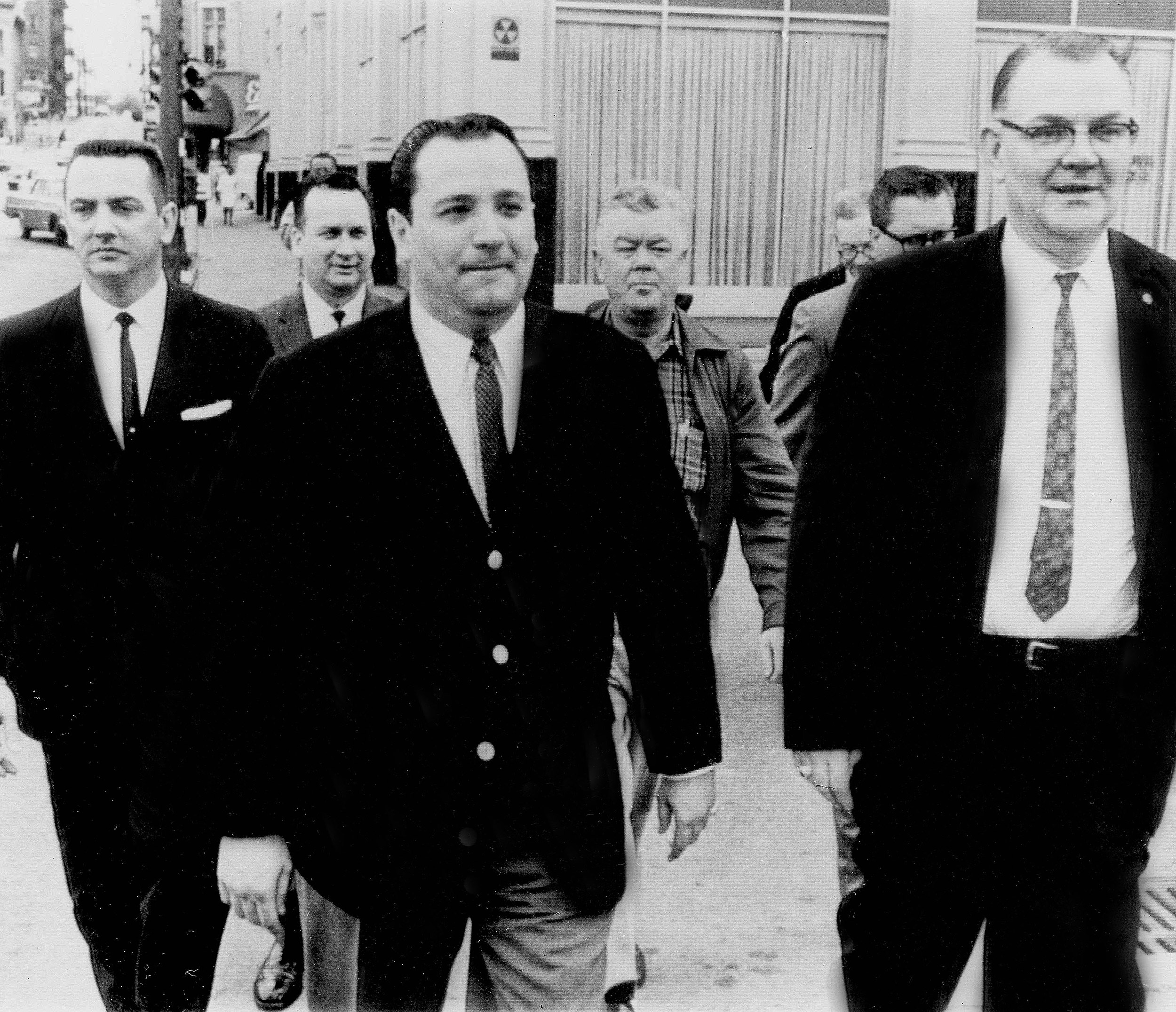
Charles L. O’Brien (center) is accompanied by U.S. marshals as he walks to the federal building to post bond after being indicted for allegedly offering a bribe to a juror in the recent Jimmy Hoffa trial in Chattanooga, Tenn., April 2, 1964.
AP Photo
GAZETTE: You go to great lengths trying to reconstruct where Chuckie could have been during the hours Hoffa was last seen alive in an effort to clear his name. What do you think happened?
GOLDSMITH: I’m convinced that the story he told to me, and that I pieced together with the help of a lot of FBI agents and a lot of documents, is the correct story. Hoffa was supposed to meet Anthony Giacalone at either 2 or 2:30 p.m. in a parking lot in suburban Detroit, near a restaurant called the Machus Red Fox. It’s a busy, well-known restaurant. Hoffa shows up for the meeting, and no one meets him there. He gets there at 2 p.m. Eyewitnesses saw him in the parking lot at 2:45 p.m. Some stopped and had conversations with him. And that was the last he was seen. He just disappeared. There was thought to be some eyewitnesses to the disappearance itself, but every one of them turned out, for various reasons, not to be credible. Chuckie was in the area in a car. It happened to be the car [owned by] the son of Anthony Giacalone. He said he was delivering a fish. And he was, in fact, delivering a fish. The FBI [originally] theorized that after he delivered this fish in the suburbs, he picked up Hoffa and took him to his killers. There were a couple reasons why they focused on Chuckie. One was it was thought that Hoffa wouldn’t get into a car with very many people. It was assumed that Hoffa got into a car that afternoon and that Chuckie was one of the few people Hoffa would get into a car with voluntarily. There’s a whole slew of circumstantial evidence that suggests he did it, a whole slew of circumstantial evidence that suggests he didn’t do it. There’s no way to prove it one way or another. The reason that, in the end, the bureau came to think he wasn’t involved, was because he was still alive. He was never killed, and if he had had information to give up, they think he would have been killed. It’s clear, and I provide lots of evidence in the book, that organized crime throughout the country was very worried about Hoffa’s efforts to get back into control of the Teamsters. The mob had taken over the money flow in the Teamsters when Hoffa went to jail in a way they never had before when he was in charge, and they were gorging on the cash and didn’t want to give it up. Hoffa was threatening, in increasingly believable ways, to expose the whole thing. He was warned and warned and warned for months. They tried to ask him what they could do to shut him up and the pressure kept building. There’s no doubt in my mind that that was the reason. He became a liability.
GAZETTE: You were frustrated at times by how much your stepdad would not tell you even after all these years. How much more do you think he knows about what happened? And with all of the central characters in the Hoffa saga deceased, why was he so reticent?
GOLDSMITH: It was drilled into him as a child by Anthony Giacalone and by his mother that you don’t rat out your friends, and you don’t speak about things you’re not supposed to speak about. I don’t think he knew who the killers were, but he knew so much about the background and about the Teamsters-mob relationship. He said to me several times, ‘It’s not that I’m worried about being killed; it’s my honor.’ He lost everything for his “role” in the Hoffa disappearance. He lost his reputation; he lost his career. It destroyed his family in many ways. This is the one thing he held onto: that he made a commitment that he wasn’t supposed to speak out of school about things he didn’t know about. I actually came, in the end, after all the hell he went through, to admire this one principle that he held onto, even though it was extremely frustrating, and it’s not my way of looking at the world.
Charles “Chuckie” O’Brien (far left) in California working on the Teamsters’ lettuce and grape campaign in July 1973.
Photo courtesy of Charles O’Brien
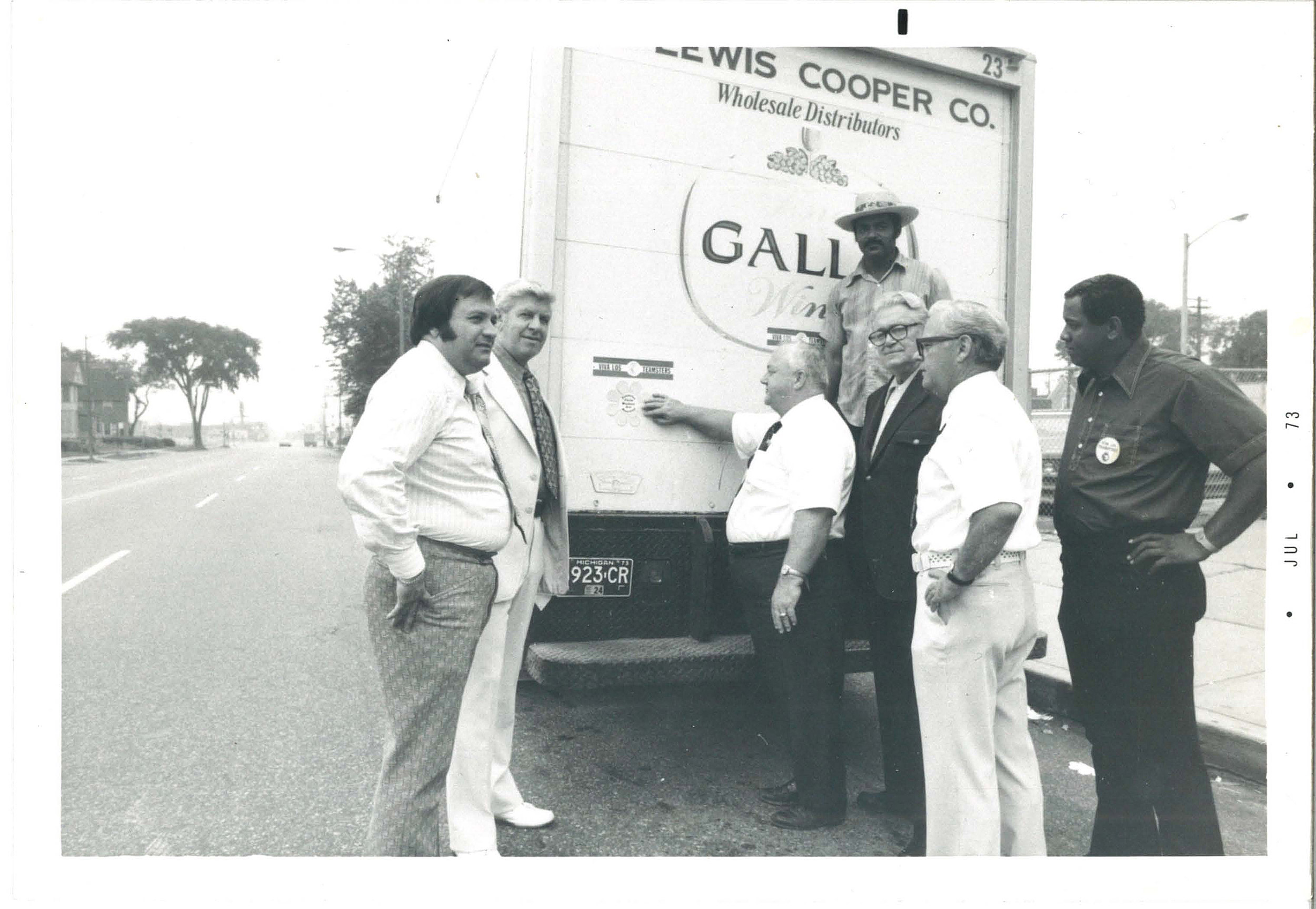
GAZETTE: Hoffa was such a well-known figure and under surveillance by federal law enforcement for years. How does he disappear without a trace and his case still remain unsolved 44 years later?
GOLDSMITH: It’s remarkable. If this had happened in 2019, it would’ve been solved like that [snaps fingers]. Today, with all the metadata that we spew and all the investigative techniques, it would’ve been very hard to pull something like this off in broad daylight with all the surveillance cameras. But in 1975, there were no surveillance cameras; there was no metadata. The body’s never been found. There’s no single piece of direct evidence of what happened to him that afternoon. It’s just the perfect crime, in that sense. They could not find any evidence. Other than the Patty Hearst disappearance, this was the largest FBI investigation ever to that point in terms of hours and money spent on the case. It went for years and years. It’s still technically an open case. There have been half a dozen false confessions; there have been 20 books with various theories; there’s a whole cottage industry [purporting] to explain what happened to Jimmy Hoffa. I interviewed about a dozen FBI agents, starting with the four who worked on the original case in ’75, all the way up through the people currently working on the case. They’ve all been obsessed by this. They dug up fields and pools and barns. They never dug up Giants stadium — that was even less credible a rumor than the others. But imagine. There have been [at least] a dozen digs over the last 45 years, maybe even more, trying to find him, one as recently as 2013. And they still haven’t figured it out.
GAZETTE: There have long been questions about Nixon’s sudden fast-tracking of Hoffa’s federal prison sentence in December 1971, given Nixon’s distaste for Hoffa and the Teamsters and suspicions about the source of money used to pay for the Watergate burglary and cover-up. Chuckie claims the most explosive rumor of all happened — that in exchange for conditional clemency, Nixon demanded and received $1 million in cash from Hoffa. He told you he is certain it happened because he delivered the bag of money from the Teamsters offices on Capitol Hill to a man in a fancy hotel room blocks from the White House.
GOLDSMITH: I believe it’s true because some of the details he told me I could corroborate. There was always a rumor about payoffs and Nixon, either to get Hoffa out of jail or put these conditions on him. There was circumstantial evidence to think that somebody paid Nixon a lot of money to commute his sentence, but Watergate investigators and Hoffa investigators looked up and down, and they couldn’t find any source for the money. They could never corroborate it. And it turned out, according to Chuckie, that it came from Hoffa. It was Hoffa’s money. He had these huge stashes of cash, and he paid for himself to get out.
“I don’t think he knew who the killers were, but he knew so much about the background and about the Teamsters-mob relationship. He said to me several times, ‘It’s not that I’m worried about being killed; it’s my honor.’ He lost everything for his ‘role’ in the Hoffa disappearance.”
GAZETTE: You say Hoffa left a “complex legacy” in the labor movement and the U.S. Justice Department. How should he be remembered by history in those realms?
GOLDSMITH: I think Hoffa was both hugely important to labor, but also partly responsible for its downfall. He was never given the credit he should have been given in the labor movement because he was always a maverick. But he was a true labor organizing genius and bargaining genius, and he brought the Teamsters to extraordinary power in the late ’50s and early ’60s. Because the Teamsters Union controlled all the transportation networks across the country, that gave him extraordinary power over the national economy, which is one of the many reasons why the U.S. government, a lot of people, were really afraid of him. He always said, ‘I would never call a national strike’ — because he had much more subtle techniques that were more effective. But the threat was always there. And since he had mob associations and didn’t like the federal government or complying with the law, this was viewed to be a great danger. But he’s never been credited for the hundreds of thousands of people who he brought from the lower classes to the middle classes and gave them a much better life. For all his troubles, the rank and file stayed with him; they were completely loyal to him for a couple reasons. One, he was one of them; he spent all his time with them; and he was honest with them. He was truly a working-class guy and had working-class values. Second, he brought them enormous material improvement. More money, better working conditions, better hours, etc. He was hugely successful in his corner of the labor movement. But his legal troubles, and the fights he had with Bobby Kennedy, and his seeming public indifference to the corruption around him and the illegality or, at least, the bad acts that he was involved in, ended up staining Hoffa’s reputation outside the Teamsters and really, all of labor.
GAZETTE: Bobby Kennedy’s seven years of investigations into Hoffa involved “excesses approaching criminality and an expansion of the surveillance state for which no one in government was ever held accountable” and that it had a “reverberating impact” on American legal culture, you write. How so?
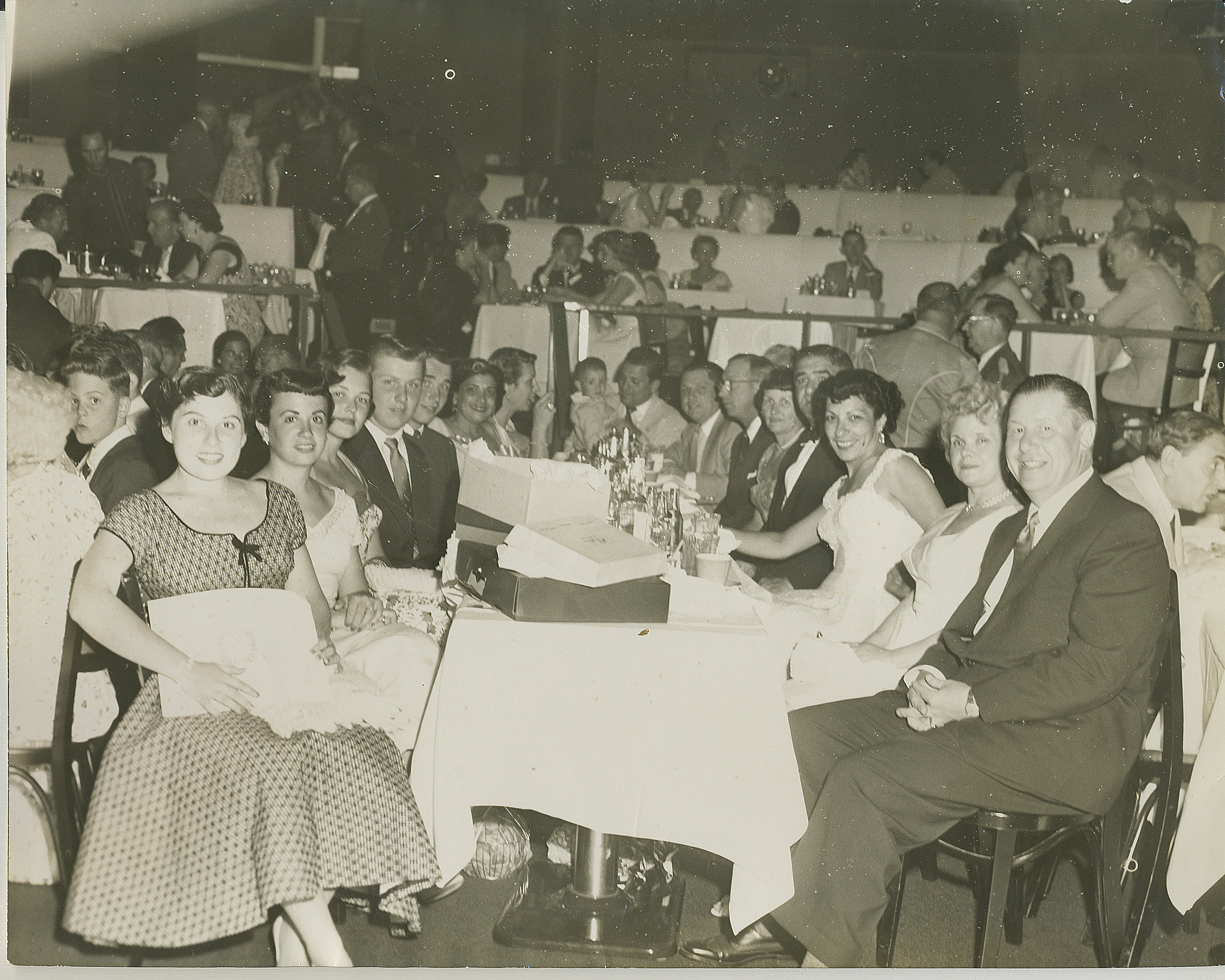
A celebratory evening in Miami Beach on Oct. 5, 1957, one day after Hoffa’s election to president of the Teamsters. Chuckie (center) is holding his young son, also named Chuckie.
Photo courtesy of Charles O’Brien
GOLDSMITH: This was a famous vendetta and is often used as an example of prosecutorial zeal and excess and of excessive zeal on [congressional] committee investigations. Some things I bring out that are less well known are the illegalities with regard to bugging, the extraordinary intrusion that the government was making on mobsters even when the Supreme Court was saying “This is unlawful,” and they kept doing it. The “reverberating impact” — there are two big ones in the book. Kennedy’s aggressive investigation of Hoffa and the mob was expressly used as a model after 9/11 with [John] Ashcroft, the attorney general I worked for and admire a great deal. A lot of people didn’t like it. And the reliance, I think, was extraordinary. It also turned out that the pattern of surveillance abuse, where the Justice Department, sort of after the fact, accommodates an aggressive surveillance technique with corner-cutting legal analysis was something that was going on in the Kennedy administration, and it also happened in the Bush administration. I was witness to that, and I was part of that, in some respects. In fact, I relied on some of the same precedents in some of my legal analysis with regard to surveillance that Kennedy was relying on, and his predecessors were relying on some things that FDR did. The government does this in cycles, in a time of crisis with a seasoned enemy that it’s afraid of. It’s not a bunch of people in the government saying, “Let’s seize people’s rights today.” That’s not the way it works. It’s fear of the unknown. It’s a genuine threat that you don’t know the scope of and want to get your hands around. It’s the knowledge that if you don’t take steps to meet it and stop it, you’re going to be condemned when goes something bad, so you take every step you can to go after it. That’s the cycle that continued after 9/11, similar to what Kennedy was doing with the mob. The amazing thing was, as I was sitting there in the Justice Department making these decisions, I was hearing my stepfather’s voice in my head, this guy I hadn’t talked to in 20 years, who basically said, “The government, when it goes after an enemy, cuts corners in secret and they’ve got ‘backup.’” That’s what he called it. And that’s what I was witnessing and, in some sense, that’s what I was participating in. That was a remarkable moment for me and that led me ultimately to reconsider him and to take steps later to reconcile with him.
GAZETTE: How did seeing such familiar institutions and episodes like the DOJ-Mafia showdown, the rise of labor unions, John F. Kennedy/Nixon rivalry, from Chuckie’s vantage point reshape your thinking?
GOLDSMITH: I learned that a lot of my views about unions and the law and justice were shaped in my college and law school years by not wanting to be like Chuckie. This book, in rethinking my relationship with Chuckie and looking at his perspective on things, did change my views about a lot of things. I wouldn’t say they changed them fundamentally, but I’m much more deeply sympathetic to labor unions and labor members because I understand the history better. My views about the Justice Department continue to evolve. I admire the Justice Department; it is an amazing institution. But it’s a flawed institution, and I understand its flaws better now. I understand that justice and truth are a helluva lot more complicated than I thought — trying to figure out what was true about Jimmy Hoffa’s disappearance and working my way through the quicksand of groundless claims that have been made for 45 years was a real challenge. I understand that there are these complicated questions of justice when the government can cut corners so easily if it wants to — leaking things on people that aren’t true in order to pressure them, excessive zeal on prosecutions, not following the rules about taxes and tax-return investigations, illegal surveillance. The government is a dangerous institution. And I knew that, but I have a greater appreciation for that.
This interview has been edited for clarity and condensed for length.



